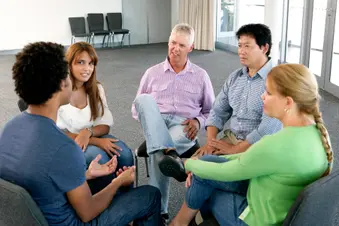
Only one to two people per million worldwide have complement 3 glomerulopathy (C3 glomerulopathy), which makes it a rare disease. Because you may not know other people who have this condition, you will need to take an active role in educating yourself about it and managing your care. When you educate yourself and advocate for yourself, you can get better care and achieve better health.
You might want to go further than self-education. It may be therapeutic for you and also benefit others. Teaching those in your circle and beyond about your condition can strengthen your network and help you get the support and understanding you need.
Build Your Knowledge
Educate yourself about C3 glomerulopathy, including your treatment options, available clinical trials, and current research. When you know more, you can take a bigger role in conversations about your health and treatment and ask your providers the right questions. This self-advocacy can improve your relationship with your care team and your satisfaction with your care.
Ask your doctor where they recommend you find more information on your disease. A few places to start include:
The National Library of Medicine has a search engine called PubMed where you can read the latest peer-reviewed studies, biomedical literature, life science journals, and online books about your disease. Much of this information is dense and scientific. If it’s hard to understand, ask your doctor about what you find.
The National Organization for of Rare Disorders Diseases (NORD) offers a rare disease database that covers signs, symptoms, causes, statistics, related disorders, existing treatments, new treatments in development, and lists of supporting organizations for C3 glomerulopathy.
NephCure Kidney International offers educational content about C3 glomerulopathy, including a detailed webinar lecture from the NephCure Patient Summit on advances in experts’ understanding of the disease.
The National Kidney Foundation’s NKF Cares is a patient information center. You can email or call a toll-free helpline with questions about your disease. A trained specialist will give you answers or point you toward more information in English or Spanish.
Teach Others
Not many people have heard of C3 glomerulopathy. When you’re educated about your disease, you can educate others and spread awareness.
Of course, who you talk to about your disease is up to you. But when you share with family, friends, and even co-workers and beyond, they will know more about how your disease impacts you, and they may understand you better. This could make you feel better in the long run.
You decide how much to share and with whom.
If you find it difficult to talk about your disease with others, consider talking with a professional counselor or therapist who can help you understand your emotions and come to terms with your condition.
Some people with rare diseases choose to spread awareness on a broader scale. This includes informing policymakers who can influence research funding and treatment development.
There are many organizations with an eye on kidney disease advocacy and rare disease advocacy, including:
The American Association of Kidney Patients works toward early disease detection and the appropriate diagnosis of rare/genetic conditions.
The National Kidney Foundation’s Voices for Kidney Health is a patient-centered organization you can join to help raise awareness of issues affecting funding, treatment, and research about kidney disease in the U.S.
The NephCure Action Network (NCAN) gives you the opportunity to go to events where you can learn more about your disease and how to work toward legal and policy improvements for rare kidney diseases.
Connect With Community
C3 glomerulopathy is rare, but you can find others who live with the disease.
The National Kidney Foundation’s C3G Community is a safe and supportive space where you can share your experiences, ask questions, and get accurate and up-to-date answers on C3 glomerulopathy.
NephCure Kidney International can help you connect with other people with C3 glomerulopathy and lead you to more support to manage your disease.
Kidneeds is a nonprofit organization that supports families living with C3 glomerulopathy and funds research on the disease. Each year, Kidneeds hosts a family conference in Iowa to help people living with the disease connect with each other and learn about the latest treatments and advances in disease research.
When you plug in to a network of people who live with or care for someone with C3 glomerulopathy, you can:
- Find comfort in knowing you’re not alone.
- Benefit from talking with someone who’s been in similar situations.
- Learn more about your condition from someone who can explain things in plain language.
- Receive one-on-one support.
- Feel more empowered about your health.
- Increase your chances of staying on track with treatment.
- Get advice on managing your emotional and physical care.
Show Sources
Photo Credit: monkeybusinessimages / Getty Images
SOURCES:
MedlinePlus: “C3 glomerulopathy.”
Alabama Rare Disease Advisory Council: “Talking to Others about your Disease.”
Mayo Clinic: “Support groups: Make connections, get help.”